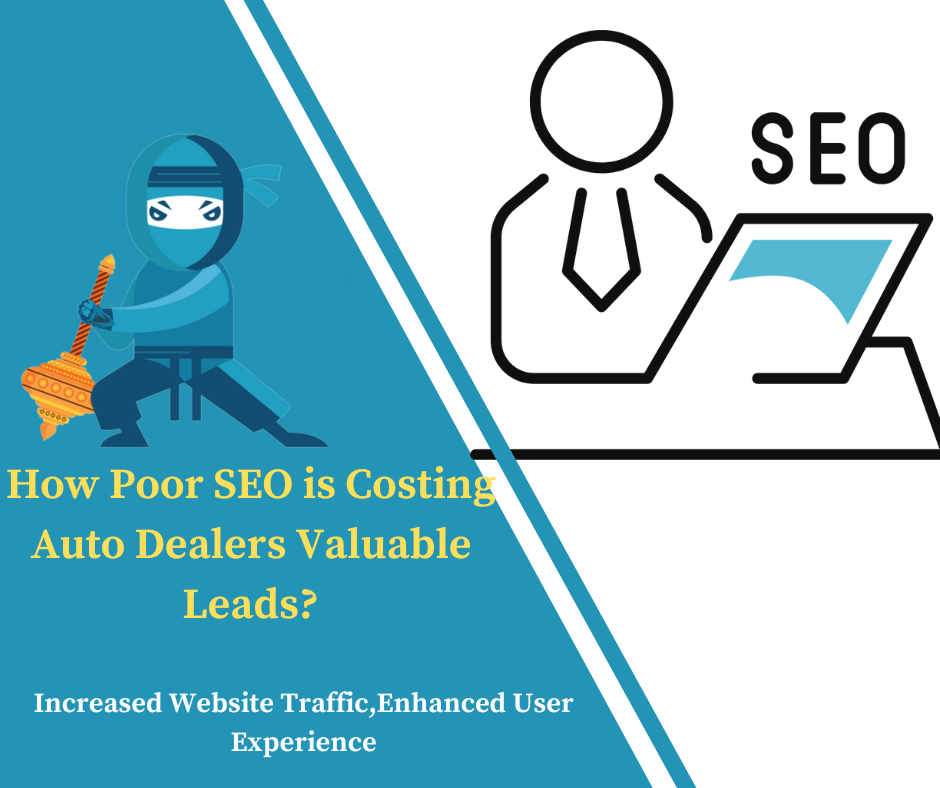How Poor SEO is Costing Auto Dealers Valuable Leads
In the digital age, car buyers start their purchasing journey online, researching vehicles and dealership options before stepping into a showroom. For auto dealers, this makes an optimized online presence essential. Yet, many dealerships still neglect a critical aspect of their online strategy—Search Engine Optimization (SEO). Poor SEO is costing auto dealers valuable leads and, ultimately, sales.
In this article, we’ll explore how ineffective SEO practices hinder dealerships from attracting potential customers and what auto dealers can do to reverse these damaging effects.
1. Poor Keyword Targeting
One of the biggest reasons poor SEO is costing auto dealers leads is ineffective keyword targeting. When potential customers search for terms like “best auto dealer near me” or “affordable used cars in [city name],” a dealership with poor SEO won’t rank high in search results. This means potential buyers are more likely to visit competitors who have optimized their sites with the right keywords.
Solution: Dealerships need to identify high-intent keywords that potential customers are likely to search for. By incorporating these keywords naturally into their website content, they improve their chances of appearing at the top of search engine results pages (SERPs).
Also read: Why Social Media Alone Isn’t Driving Leads for Dealerships
2. Neglecting Local SEO
Local SEO is essential for auto dealers, as most buyers search for vehicles within their geographical region. Poor local SEO practices, such as failing to optimize Google My Business (GMB) listings or ignoring local keywords, reduce visibility in local search results.
If an auto dealer’s business profile isn’t complete or lacks accurate information, they risk being overlooked by local searchers. Google prioritizes dealerships with verified GMB listings that contain up-to-date hours, contact details, and reviews.
Solution: To enhance local SEO, auto dealers should optimize their GMB profiles, add accurate business information, and encourage customers to leave reviews. Local keywords should also be included in meta tags, headings, and on-site content to attract local buyers.
3. Slow Website Speed
Website speed directly impacts user experience and search engine rankings. If your dealership’s site takes too long to load, users will leave before the page even appears. Google also penalizes slow-loading websites, meaning that poor SEO is costing auto dealers their rank in SERPs and, in turn, valuable leads.
Solution: Optimize your website speed by compressing images, using faster hosting services, and enabling browser caching. A faster website means higher rankings, reduced bounce rates, and more leads.
4. Lack of Mobile Optimization
With more car buyers browsing on mobile devices, mobile optimization is critical. If your dealership’s site isn’t mobile-friendly, you’re missing out on a significant chunk of traffic. Poor SEO practices, such as neglecting to implement responsive design, make your site difficult to navigate on smaller screens. This will cause visitors to leave and seek out competitor sites that offer a better mobile experience.
Solution: Implement a responsive web design that adjusts to all screen sizes, ensuring that mobile users have a seamless browsing experience. Google rewards mobile-friendly websites with better rankings, leading to more leads.
5. Poor Content Strategy
Content is still king when it comes to SEO. However, poor SEO is costing auto dealers leads due to a lack of quality, engaging content. If a dealership’s website only has generic vehicle descriptions and doesn’t provide valuable information (such as blogs, FAQs, and how-to guides), search engines won’t rank the site well.
Solution: Develop a robust content strategy that includes informative blog posts, buyer guides, and SEO-optimized product descriptions. Fresh, high-quality content not only helps SEO but also positions your dealership as an authority in the industry, increasing trust and conversions.
6. Ignoring Technical SEO
Technical SEO issues, such as broken links, duplicate content, and incorrect XML sitemaps, can severely hurt a website’s performance. Poor SEO is costing auto dealers because search engine crawlers may struggle to index the site correctly, leading to lower rankings.
Solution: Conduct regular technical SEO audits to identify and fix issues like broken links, improper redirects, and missing alt texts for images. Ensuring a well-structured, technically sound website helps improve search engine visibility.
7. Not Utilizing Analytics for Continuous Improvement
Failing to track SEO performance is another costly mistake. Auto dealers who don’t analyze their SEO metrics have no way of understanding what’s working and what needs improvement. Without regular performance checks, poor SEO is costing dealers the opportunity to optimize their strategies and generate more leads.
Solution: Use tools like Google Analytics to monitor traffic, bounce rates, and conversions. By tracking these metrics, dealerships can make data-driven adjustments to their SEO strategy, ensuring continuous improvement.
8. No Focus on Link Building
Backlinks from reputable sources signal to search engines that your website is credible and trustworthy. However, many auto dealers neglect link-building efforts, leading to poor SEO results. Without strong backlinks, a dealership’s website is less likely to rank for competitive terms.
Solution: Implement a link-building strategy by partnering with local businesses, sponsoring events, and creating shareable content. The more high-quality backlinks your dealership earns, the better its search engine ranking will be, leading to more leads.
FAQ
Why is SEO important for auto dealers?
SEO is crucial for auto dealers because it improves the visibility of their websites in search engine results. This increases the chances of attracting potential customers who are actively searching for vehicles or dealerships in their area.
How does poor SEO affect lead generation for auto dealers?
Poor SEO prevents dealerships from ranking high on search engine results pages. As a result, potential leads may never find the dealership’s website, opting instead for competitors with better SEO.
What are the key components of SEO for auto dealerships?
Key components include keyword optimization, local SEO (especially Google My Business), mobile optimization, fast website speed, quality content, and technical SEO.
How can auto dealers improve their local SEO?
Auto dealers can improve local SEO by optimizing their Google My Business listing, using local keywords in their content, and ensuring that they receive and respond to customer reviews.
What is the impact of website speed on lead generation?
A slow website can lead to high bounce rates, meaning visitors leave before the site fully loads. This affects user experience and causes Google to rank the website lower, resulting in fewer leads.
Why is mobile optimization critical for auto dealers?
With more users browsing the internet via mobile devices, having a mobile-friendly website is essential for reaching a broader audience. Google also ranks mobile-optimized sites higher, increasing the chances of attracting leads.
How can auto dealers fix poor SEO practices?
Auto dealers can fix poor SEO by conducting audits, optimizing for local and mobile searches, improving website speed, creating quality content, and building backlinks from reputable sources.
Hire Figma Developer
Conclusion
In today’s competitive automotive market, poor SEO is costing auto dealers valuable leads. From ineffective keyword targeting and poor local SEO to slow website speeds and a lack of mobile optimization, these issues prevent dealerships from appearing in front of their ideal audience.
By prioritizing SEO improvements—such as optimizing for local search, speeding up the website, creating quality content, and building links—auto dealers can enhance their online visibility and attract more potential customers. The sooner a dealership invests in strong SEO, the more leads they’ll convert into sales.








